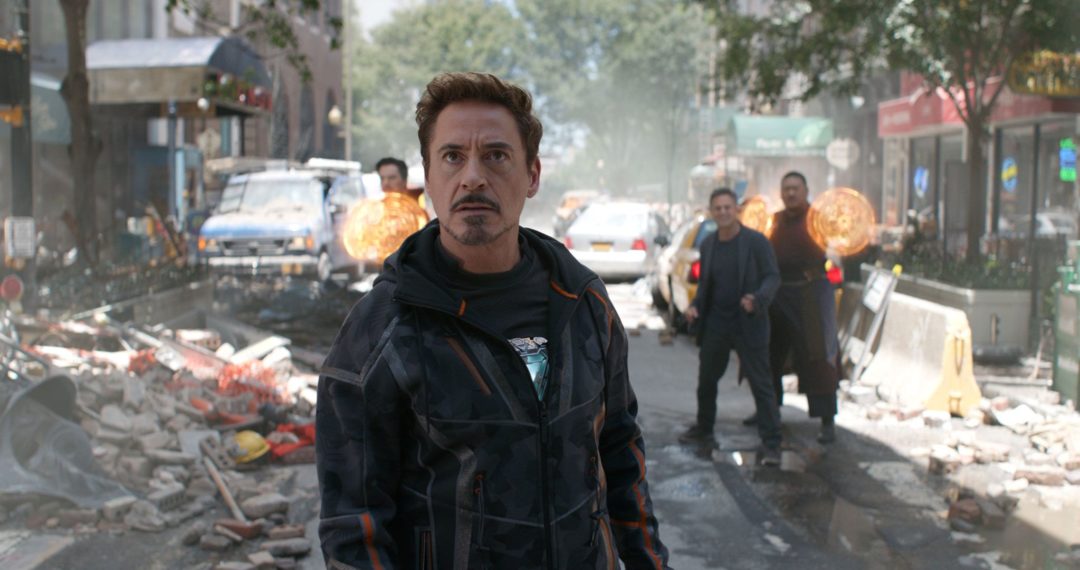This article contains spoilers for Avengers: Endgame.
Iron Man shouldn’t have worked. The star actor was a scandal-ridden has been, the director was best known for a family-friendly Christmas movie, and the property wasn’t profitable enough for Marvel to sell off to another studio. The Dark Knight, a movie starring a far more famous version of the genius billionaire playboy philanthropist superhero archetype, was coming out just a few months later. On the surface, even the script seemed as odds with making Iron Man popular. He didn’t just begin the movie as an asshole; he’s a self-involved prick even after he started saving lives. There’s not much to like about Tony Stark. That’s precisely what makes him great.
I was cheering by the time the film ended and Robert Downey Jr.’s Tony Stark, refusing to hide his superheroics, informed a crowd of reporters: “I am Iron Man.” Marvel demonstrated for the first time its impressive power to make people care deeply about a superhero they had no previous attachment to. My only exposure to Iron Man had come from his appearances in Marvel comic books and shows starring other characters I actually liked. Batman was my preferred haunted, obscenely wealthy vigilante No matter how many gadgets he had in his utility belt — or how improbable his backstory was — he still felt like a gritty underdog when stacked against the suits that let Iron Man fly and take a punch from the Hulk.
Iron Man, in stark contrast, was the walking incarnation of hubris. The 2008 film opens by portraying Stark as a womanizing drunk who constantly frustrates his beleaguered employees with his irresponsibility. No scene expresses his character better than the Jericho missile test, when Downey stands in a sharply tailored suit and shades wowing military brass with a speech about his family’s legacy and America’s dominance. Tony overwhelms his audience with a demonstration of incredibly destructive power, then acts like it’s no big deal with a needlessly showy finishing touch of unveiling a suitcase mini-bar that lets him toast “to peace.”
Tony’s just an old-fashioned jerk. Even when he’s shown hardship and tragedy by being held hostage by terrorists, he’s only slightly repentant. Sure, he vows to start keeping the peace in earnest rather than just profiting off of war, but he’s still an arrogant showoff desperate to prove he’s the best, quick to discard things that should have emotional significance like the arc reactor in his chest, and unwilling to let S.H.I.E.L.D. or anyone else tell him what to do. Iron Man saves lives by endangering others and himself, and his cocksure conviction that that’s the right thing to do means that while he’s hard to like his presence is intoxicating.
Superhero stories have traditionally been dominated by big-hearted honorable heroes and brooding angsty ones. Iron Man presented something in between. Tony covered up anger and fear with jokes. When things were going well, it was incredibly obvious he was having fun. Downey Jr.’s perpetually smug portrayal and the film’s snappy lines made him a pleasure to watch even if the plot really just boiled down to the bad guy building a bigger, badder set of power armor and Iron Man somehow winning anyways.
It’s remarkable that the character could be written and directed by so many different people over the course of the MCU and still keep that charm rather than devolving into a caricature or suddenly becoming a saint. Instead we got steady character growth over the course of a decade where Tony’s heroism and hubris went hand in hand. In The Avengers, he strips off his armor to threaten Loki as the spokesman for the Earth’s mightiest heroes. “There is no version of this where you come out on top,” he says. But it’s only his own willingness to sacrifice himself to defeat the Chitauri that actually secures the team’s victory.
Those dueling aspects of Tony’s nature don’t always work out so well. The primary conflict of Avengers: Age of Ultron comes from Tony’s belief that he has a solution to world peace that would allow him to bask in adoration without having to actually put his life on the line. In the first sign that he might become a family man, Tony produces a robotic son who inherits his worst characteristics. Stripped of Tony’s underlying compassion and unanchored by the people who have been positive influences on his behavior, Ultron nearly destroys the world and sets up the conflict of Captain America: Civil War that would tear the Avengers apart.
Avengers: Infinity War was a humbling experience for Tony and the rest of the Avengers. But as devastated as Tony is by his failure to save his young protege, Peter Parker, pride pushes him to shift the blame around to other heroes. At the beginning of Avengers: Endgame, Tony is furious at Captain America for prizing liberty over security, theorizing that an army of automated suits could have made a difference in the fight against Thanos. Even though Dr. Strange said he only saw one possible way to save the world, it takes Tony most of the movie to realize that giving up the Time Stone was part of a greater plan and not an act of supreme foolishness.
But again hubris gives way to heroism. When the Avengers come to him with their time travel proposal, Tony initially refuses because he’s found contentment with his new family. But the knowledge that he’s the only man smart enough to make it possible drives him to help anyways. The question of who should use the Infinity Stones to bring back everyone Thanos killed comes down to a debate between Thor and Bruce Banner that Tony stays out of. But in the end he proves that while he might not be the strongest Avenger, he’s willing to do whatever it takes to win. “I am inevitable,” Thanos tells him. “I am Iron Man,” Tony responds. This time the whole audience cheered.

And then I cried with Peter and Pepper Potts. No one, not even the people who loved him the most, could save Tony from the unique combination of being arrogant enough to think he could save the world and brave enough to accept the consequences. As Pepper whispered to him “We’re going to be OK. You can rest now,” it felt like she was offering assurances not just from his wife and fellow armored superhero but from the entirety of the MCU. The funeral that followed provided a way for both the audience and the characters to mourn together.
Downey Jr. and Iron Man created a heroic legacy that could satisfy the biggest ego. They established a group of successors that continue to challenge what makes a superhero movie work. They are funny and weird, wizards and aliens, women and people of color. Iron Man saved the world in Endgame, but long before that, he saved Marvel itself by being an arrogant asshole that everyone could love.






Published: May 3, 2019 10:44 am